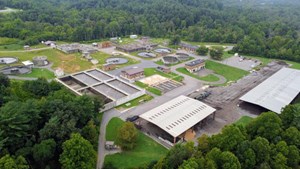North Carolina receives $789.4 million in funding for drinking water, wastewater projects
(UC) — Governor Roy Cooper announced on July 27 that communities statewide will receive a record $789.4 million in water and wastewater infrastructure funding to help pay for 385 projects statewide, including 140 construction projects.
“Clean drinking water is necessary for healthy families and thriving communities and businesses," said Governor Roy Cooper. "The historic level of investment provided by the American Rescue Plan will help increase resiliency, support economic growth in our state and improve access to clean water in the communities that need it most.”
The Department of Environmental Quality’s Division of Water Infrastructure received more than 700 applications from 94 of North Carolina’s 100 counties, requesting more than $3.1 billion. This funding round included the first awards of American Rescue Plan Act water and wastewater funding on the state level, as well as $174,846,696 in funds that were appropriated in the 2022-23 state budget, signed by Governor Cooper on July 11, 2022.
“These funds will replace aging infrastructure and help utilities remain viable, which benefits the health and economic well-being of communities across our state,” said DEQ Secretary Elizabeth S. Biser.
Five projects will provide water connections in underserved or disadvantaged communities:
- Sampson County will receive $13,283,000 to provide water system connections for the community of Ivanhoe.
- Nash County will receive $12,775,170 to extend waterlines to connect Nash County Area II and Northern Nash water systems.
- Greenevers, in Duplin County, will receive $1,300,466 to install waterlines for 63 new connections in underserved areas.
- Edgecombe County will receive $1,126,850 to install waterlines and 20 new services to disadvantaged areas.
- McDowell County will receive $815,437 to extend waterlines to a potentially underserved block group.
Other notable projects include:
- Andrews, in Cherokee County, will receive $13,798,000 for drinking water line replacements and wastewater treatment plant upgrades.
- Fairmont, in Robeson County, will receive $15 million for wastewater collection system rehabilitation.
- Cliffside Sanitary District, in Rutherford County, will receive $2,861,966 for wastewater system repairs and treatment plant retrofits.
- Edenton, in Chowan County, will receive $4,854,725 for two new water wells and to conduct Asset Inventory and Assessments.
- Sanford, Fuquay-Varina and Holly Springs, in Lee and Wake Counties, are jointly receiving $55,000,000 for a regional project involving expansion of Sanford's water filtration facility.
- Lake Lure, in Rutherford County, will receive $200,000 to conduct an asset inventory assessment of their sanitary sewer system, which is located beneath the lake.
- Ocracoke Sanitary District, in Hyde County, will receive $5,753,000 for a water tank replacement and asset inventory and assessment of their drinking water system.
- Littleton, in Halifax County, will receive $2,276,500 for wastewater treatment plant improvements and pump station rehabilitation.
A list of all projects funded statewide by town or county is available online. The Division of Water Infrastructure website features a map illustrating the statewide distribution of funded projects in the Spring 2022 funding round.
The State Water Infrastructure Authority approved the awards during the July 14 meeting. Funding this round also came from the Viable Utility Reserve and the Drinking Water and Wastewater State Reserves, funded from American Rescue Plan Act (ARPA) funds allocated to the State, and the Drinking Water and Clean Water State Revolving Funds. Projects funded from the Viable Utility Reserve are conditional upon approval by the Local Government Commission.
The Authority is an independent body with primary responsibility for awarding federal and state funding for water and wastewater infrastructure projects. Other responsibilities include developing a state water infrastructure master plan, recommending ways to maximize the use of available loan and grant funding resources, and examining best and emerging practices.
The application period for the next round of funding for water and wastewater infrastructure projects, which will include the first ARPA stormwater funding, ends on Sept. 30 at 5:00 p.m.
Related News
From Archive

- Glenfarne Alaska LNG targets late-2026 construction start for 807-mile pipeline project
- U.S. water reuse boom to fuel $47 billion in infrastructure spending through 2035
- $2.3 billion approved to construct 236-mile Texas-to-Gulf gas pipeline
- Major water pipe break in Puerto Rico hits over 165,000 customers
- Potomac River Tunnel project enters construction phase beneath Washington, D.C.
- Pennsylvania American Water launches interactive map to identify, replace lead water service lines
- Trump's tariffs drive $33 million cost increase for Cincinnati sewer project
- Utah city launches historic $70 million tunnel project using box jacking under active rail line
- Tulsa residents warned after sewer lines damaged by boring work
- Fatal trench collapse halts sewer construction in Massachusetts; two workers hospitalized




Comments